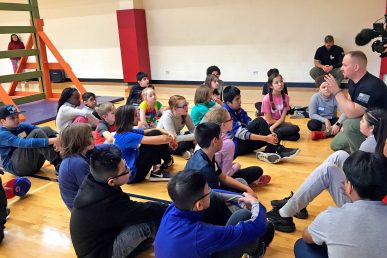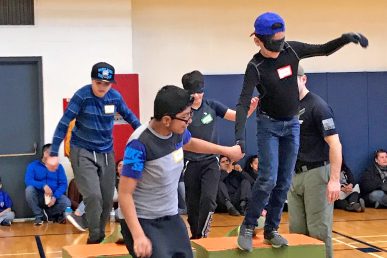Craniofacial Center hosts ‘boot camp’ to build confidence, teamwork in kids

Thirty Chicago kids participate in Project BUILD (building understanding and individual leadership development), a camp hosted by the UI Health Craniofacial Center with help from the Face the Future Foundation and Hot Ground Gym.
Nearly 30 kids, age 10 to 14, are participating in a UI Health Craniofacial Center camp meant to help adolescents and preadolescents at risk for low self-esteem and high levels of insecurity build confidence and embrace teamwork.
“We want kids who think, ‘I can’t do that,’ to realize how much strength and potential they have,” said Dr. Janine Rosenberg, a pediatric psychologist in the center.
Of the kids participating in the camp, which is called the Confidence Project, about half are patients of the center who have craniofacial differences, such as cleft lip and palate or a genetic disorder.
“Research has shown that kids who look different are likely to have higher levels of anxiety and fear of rejection that can significantly impact their confidence when it comes to working with others,” said Rosenberg, UIC assistant professor of clinical psychology. “We wanted to provide a safe and, equally important, fun space where kids can build skills like teamwork, trust and confidence.”
The Confidence Project is designed to help kids build skills around six pillars: self-assurance, teamwork, character building, trust, leadership and strength.
The other participants are kids without craniofacial conditions from Chicago’s Walt Disney Magnet School. Rosenberg says having a mix of patients and non-patients is helpful for creating a sense of equality in the group.
To host the camp, which is sponsored by the Face the Future Foundation, the center is collaborating with Hot Ground Gym, an activity program founded in 2013 by two military veterans with a mission of shaping today’s kids into strong and confident individuals through fun and physical activity.

Kids participate in confidence and team building activities like trust falls and navigating obstacles while blindfolded.
“The kids, and sometimes their families, participate in a series of physical activities, similar to a ropes course or family-friendly boot camp,” Rosenberg said.
One activity, for example, is a trust walk — one partner wears a blindfold while the other has to guide him or her across a series of obstacles, saying “duck here” or “step here.” Another activity has the group lifting one of their peers, who is sitting in a canoe and moving him or her across the room. Following the activities, kids will participate in a group session led by Rosenberg.
Kids and parents will fill out a survey when the camp is complete. The goal is to see an improvement in self-assessed resilience, as measured by statements like, “I am able to adapt when changes occur,” and “I believe I can achieve my goals, even if there are obstacles.”
Participants meet once a month, through June, on the UIC campus. The camp’s theme is “no failure,” a message Rosenberg says she hopes will remind participants they are not limited by their differences.
